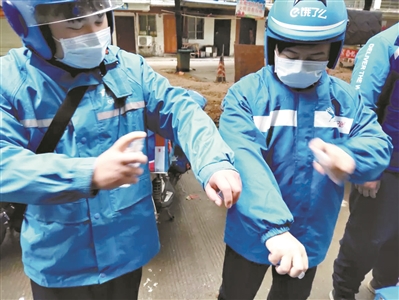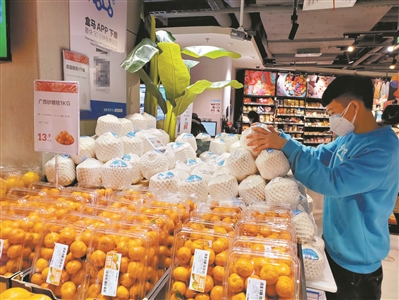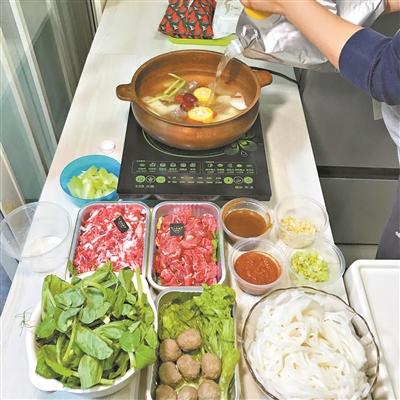Catering enterprises in the face of the epidemic in addition to force takeaway, what other tricks?

The delivery guy sprayed disinfectant on his body.

Catering enterprise employees "fire line to join" fresh food platform.

Soup base, ingredients, special thermal insulation container… Takeaway hot pot "all internal organs"
Text, Photo/Guangzhou Daily All Media Reporter Zeng Fanying, Correspondent Zhang Bin, Xian Wenxin
Yesterday was the first day after the Spring Festival that enterprises resumed work and production, and many catering businesses have experienced a long Spring Festival holiday.
At present, many catering enterprises are facing difficulties, actively responding, and exploring and seeking to break through. Recently, various catering private enterprises have launched countermeasures to meet market demand and create more new opportunities for their own development. How effective various countermeasures are remains to be seen. Are they ready for the arrival of "spring"?
Countermeasure 1: cooked food, work in progress, fresh ingredients can be takeaway
"Alan’s Food Group" is the WeChat "fan group" of Liyatu, a well-known western restaurant in Guangzhou. In just one week, the number of people in the WeChat group has exceeded 400. Fans place orders in the WeChat group to buy Liyatu’s online products, and the store uses "errands" to deliver them to their doors. The restaurant either publishes "advertisements" through the WeChat official account and Moments, or launches a takeaway platform, or communicates through WeChat customer service to achieve consumption. A Chaoshan beef hot pot-themed store in Dongshankou generates 70% of its daily turnover from takeout. As dine-in food is cold, takeout has become the main source of income for many restaurants. Catering companies have also paid attention to takeaway safety issues: body temperature monitoring, safety labels, contactless delivery, sealed boxes… all kinds of measures have been used.
In addition, sinking community service is also one of the directions to break through. Chen Na, director of the brand value growth center of Yunnan Yunhai Food Catering Management Co., Ltd., said that after the epidemic, they increased the investment of some resources in online retail and quickly organized manpower to establish distribution policies. "We are exploring the establishment of a community service station within a radius of three kilometers of the store. This service station uses the advantages of Yunhai Food’s existing supply chain and logistics to help residents within a three-kilometer radius to purchase fresh ingredients and work in progress, and then deliver them to their door through community group buying." Chen Na said, "At present, we have established 100 community stations across the country."
Countermeasure 2: Sharing labor to ease cost pressure
Wei Xuxiang, founder of United Food, told reporters that in an ordinary Cantonese restaurant with an area of about two or three hundred square meters, the labor cost accounts for about 15% to 20%, which is higher than the rental cost.
The reporter learned that at present, a number of urban areas in the province have issued announcements requiring restaurants to stop eating in the lobby to avoid dinners, and Panyu District is one of them. Many employees are temporarily out of work, and labor costs are a big expense for catering companies. Recently, Hema Fresh, a subsidiary of Ali, has reached a "shared employment" with catering companies to solve the problem of personnel waiting for work in catering companies, reduce the cost pressure of catering companies, and also alleviate the challenge of insufficient manpower in the supermarket lifestyle consumer industry.
Guangzhou Daily’s full media reporter learned that more than 30 catering companies, including Xibei, Naxue, and Tanyu, are communicating and cooperating with Hema. At present, 57 degrees Xiang, Chayan Yuese, Shu Daxia, Wangxiangyuan and other catering companies have reached a cooperation with Hema, and will support more than 500 employees of Hema in total. They will be involved in packing, sorting, shelves, catering and other work, and their labor compensation will be paid by Hema. Hu Qiugen, general manager of national operation and management of Hema, said that catering companies need to solve the problem of personnel waiting for work. At the same time, their employees are safe and professionally trained, "which can quickly help solve the difficulties of increasing orders and insufficient manpower."
Yunnan Yunhai Food Catering Management Co., Ltd. brand value growth center director Chen Na said that the current line traffic counting is low, in addition to docking box horse, they are also docking other online retail, to achieve the output of the human part, to ease the pressure of manpower.
Cheng Gang, secretary-general of the Guangdong Catering Service Industry Association, told Guangzhou Daily that the association is currently working with professional third-party human resources enterprises to meet their needs, hoping to allocate the rich manpower of Guangdong catering enterprises by transferring jobs or enterprises, including coordinating the deployment of excess manpower from some catering enterprises to pharmaceutical enterprises and factories with greater demand for personnel.
Countermeasure 3: "Slim down" in time and wait for the market to recover
These days, the chairperson of Yaohua Catering Group, Qu, can’t sleep at night again, thinking about solutions. Two days ago, he made a painful decision to close five of his brand stores. So far, there are 15 stores left in the group, distributed in Liwan, Yuexiu, Tianhe and Baiyun districts. Yaohua Group is a Guangzhou Catering Group with a series of Lingnan-style brands such as Goose Gong Village, Banmanwan, Lingnan True Flavor, Flavor Rice Congee City, and Shahefen Village. There are a total of 2,000 or 3,000 employees in its 20 stores. Now, he has to "break his arm" and give up some stores in order to reduce losses as much as possible. At the same time, he compensates employees and introduces other stores that "pass the file" to work according to the needs of employees.
Diandude, a well-known catering company in Guangzhou, revealed that all its store dine-in business is currently closed, leaving only a few stores to operate takeaway business. "On the one hand, we respond actively, and on the other hand, we face it calmly and wait patiently," Shen Zhihui, general manager of Diandude, told reporters. Shen Zhihui’s family has been engaged in the catering industry for generations and also experienced the "SARS" period. He said that the response at that time was to "lose weight", reduce the business area, focus on the main business, and at the same time pay attention to food safety and wait for the market recovery.